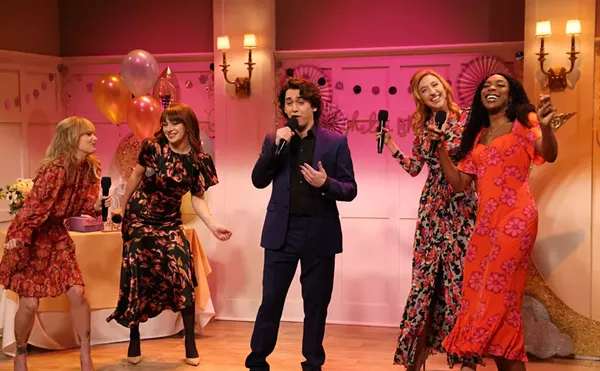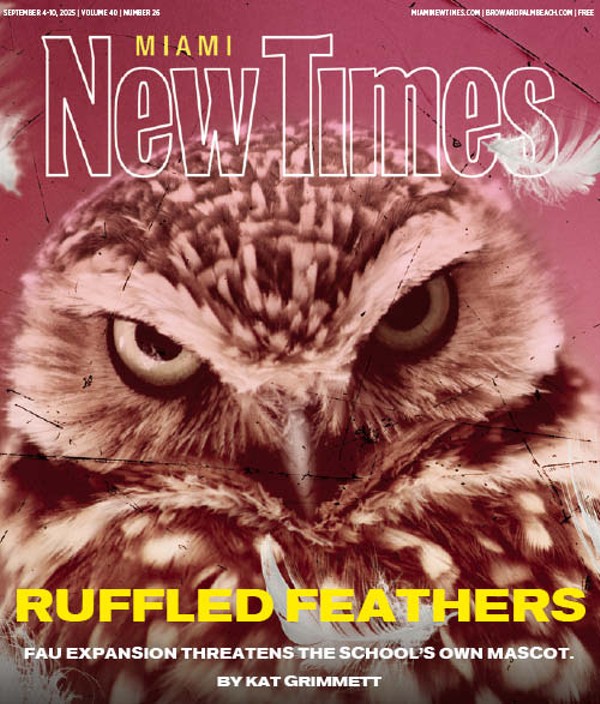It's just before the curtain call of The Great American Trailer Park Musical. An agoraphobe named Jeannie Garstecki, played by Margot Moreland, stands in the sunlight outside her doublewide for the first time in 20 years, clutching Ice Capades tickets to her chest as though they were holy relics. It's a good penultimate image for Trailer Park, because it exposes the show's cruel and venal soul. It tells us that trailer park victories are small and that the things that matter to trailer park people are laughable. There is no hint, in that image or in any other offered by the show, that its subjects are good for anything more than a cheap joke. It certainly never hints that the victories and values of Trailer Park's well-heeled Coral Gables audience might be revealed, by time or distance, to be equally tacky.
The long chain of events that brought Jeannie Garstecki into the sun with her Ice Capades tickets began with the kidnapping of her child 20 years earlier, right around the time of her marriage to Norbert Garstecki. They were already living in Armadillo Acres — a garishly appointed trailer park in Starke, Florida, that would send John Waters running for the burbs. (Kudos to Actors' Playhouse's set designer, Sean McLelland, whose marvelously versatile stage displays all the nuance and creativity that Trailer Park creators David Nehls and Betsy Kelso apparently lack.)
The park's manager is a gutsy broad named Betty (Meghan Colleen Moroney), who — along with her friends Lin (short for Linoleum, because she was born on the kitchen floor, played by Stacey Schwartz) and Pickles (Gwen Hollander) — narrates the action and fills in the backstory. Jeannie hasn't gone outside since the kidnapping, and hubby Norbert has, till now, remained dutiful and faithful and good, going to work each day as a toll collector and coming home to his weird wife without a peep of complaint. But a dark and mysterious stripper named Pippi (Kelly Atkins) is moving in next door, and she's got a thing for Norbert. How will he weather the temptation? And will Pippi's marker-sniffing and fantastically violent ex-boyfriend, Duke (Christopher A. Kent), drive down from Oklahoma City and kill them all?
These are the questions Trailer Park poses, and the answers probably don't matter. These people are not people, even by the cartoonish standards of the farcical musical. Though Trailer Park has a few touching moments — most notably the song "You Are the Owner of My Heart," during which Jeannie and Norbert sing of their shopworn love — the show as a whole is more notable for treating its characters the way blacks were treated in old-time minstrel shows. Most of its jokes rely on the audience's assumed superiority to the tacky, dumb trailer park people, and we are expected to respond to their trials and tragedies in a way we'd never allow ourselves if the show's subjects were a less pathetic segment of the population.
In Trailer Park, the kidnapping of the Garstecki baby is a joke: We see the child swiped, in flashback, and realize the culprit got away because Jeannie was busy worrying about a terrible perm. There she is, clutching her hair in mortification and bawling to her husband while someone who looks like the Hamburglar shimmies onstage and snatches the kid. (We later learn that, for months, the kidnapper believed he had kidnapped a dog, which apparently is supposed to mean that white-trashiness is an inherited trait.) Elsewhere, and over and over again, the women of Armadillo Acres gaily elucidate their low expectations of their mates. During the song "But He's Mine/It's Never Easy," two characters sing of the man of their dreams: He's dumb, he's boring, he's poor, and when I ride in his car, I have to keep a grip on the handle lest the door fly open and send me spilling into the street, but at least he's mine. Later, Lin sings of her own hubby's redeeming qualities: He never joined the Klan, and he was on television once. (It was C-SPAN, which covered his murder trial.)
All of this is actually very funny in practice. The audience hoots and hollers, and I hooted along with them. Contempt for fellow humans is often amusing. When amplified by the talents of actors of the caliber of Margot Moreland and Kelly Atkins, Trailer Park's selective misanthropy could become the highlight of your week. I enjoyed the hell out of Moreland's interpretation of agoraphobia — the way her muscles seem at war with each other as she takes step by excruciating step from the safety of her doorframe. Atkins's pole dance defies gravity, and I doubt I've ever seen a performer be so slatternly and so likeable at the same time. (You have to dig the way she announces herself with every line as if she's daring you to say she's not good enough to invade your space. "I need a place to live that's cheap and private," she says, "and where people got so many problems of their own that they don't worry about no one else." She says it with such conviction that, even if you don't have a place available, you'll slap some linens on the couch and invite her in, just to keep her from jamming one of her fabulous, spiky pumps up your ass.)
But Trailer Park is fundamentally inexcusable. If you're mystified by that declaration, if you think Trailer Park might be a bit of harmless fun at the expense of a population that could do with some ribbing, please imagine this show was called The Great American Working-Class Musical and that it asserted that all poor people were stupid, that their children were indistinguishable from dogs, and that poor husbands were dumb and boring and incapable of fixing a car. All in good fun? Maybe. Until the proletarian masses swarm your lobby and skewer you on their pitchforks, staining their Kmart threads with your blue, blue blood.
One could perhaps draw a distinction between "the poor" and "trailer trash," but that would sound creepily like the ridiculous declaration, occasionally made by racist white people out to prove how not-at-all racist they are, that "there are black people, and then there are n***ers." Maybe that's an abstruse point, and one we shouldn't expect Nehls and Kelso to arrive at on their own. After all, they wrote this thing, apparently without realizing the Bon Jovi and Dierk Bentley songs that theaters would play as filler before curtain-up would outclass, outshine, and even outwit every by-the-numbers show tune they penned.










